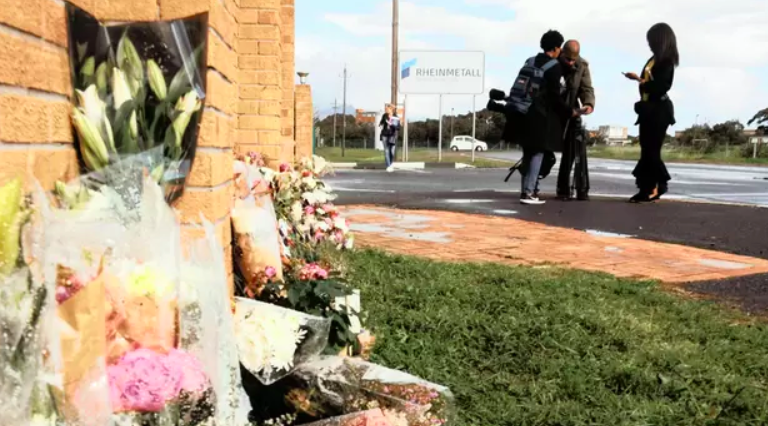
By Terry Crawford-Browne, September 4, 2019
From IOL
Section 24 of South Africa’s Constitution declares: “Everyone has the right to an environment that is not harmful to their health or well-being.”
The reality, tragically, is that provision of the Bill of Rights remains unenforced.
South Africa ranks among the worst countries in the world in terms of pollution issues. The apartheid government just didn’t care, and post-apartheid expectations have been betrayed by corrupt and callous officials.
Yesterday, September 3, was the first anniversary of the explosion at the Rheinmetall Denel Munition (RDM) factory in the Macassar area of Somerset West. Eight workers were killed and the building was demolished in the blast. A year later, the report into the investigation has still not been released to the public or to the families of the deceased.
Research in the US and elsewhere confirms that communities living close to military and armaments facilities are severely affected by cancers and other diseases resulting from exposure to toxic materials.
Impacts of military pollution on health and the environment are not always visible, immediate or direct, and often present themselves many years later.
More than 20 years after the AE&CI fire, victims in Macassar suffer severe health problems and, in addition, have not been financially assisted. Although farmers who suffered crop damage were generously compensated, the residents of Macassar – many of them illiterate – were tricked into signing away their rights.
The UN Security Council, in a landmark decision in 1977, determined that human rights abuses in South Africa constituted a threat to international peace and security and imposed a mandatory arms embargo. The decision was hailed at the time as the most significant development in 20th century diplomacy.
In its efforts to counter that UN embargo, the apartheid government poured huge financial resources into armaments, including at Armscor’s Somchem plant in Macassar. This land is now occupied by RDM and, it is alleged, is massively and dangerously contaminated.
Rheinmetall, Germany’s major armaments company, blatantly flouted the UN embargo. It exported a complete ammunition factory to South Africa in 1979 to manufacture 155mm shells used in G5 artillery. Those G5 howitzers were intended to deliver both tactical nuclear weapons and chemical and biological warfare (CBW) agents.
With encouragement from the US government, the weapons were exported from South Africa to Iraq for use in Iraq’s eight-year war against Iran.
Despite its history, Rheinmetall was permitted in 2008 to take a controlling 51% shareholding in RDM, the remaining 49% being retained by the state-owned Denel.
Rheinmetall deliberately locates its production in countries such as South Africa in order to bypass German export regulations.
Denel also had another ammunition plant in Cape Town at Swartklip, between Mitchell’s Plain and Khayelitsha. Testimonies in Parliament in 2002 by widows and former employees before the portfolio committee on defence were followed by community protests when tear gas leaks traumatised local residents.
Denel shop stewards informed me back then: “Swartklip workers don’t live very long. Many have lost their hands, their legs, their eyesight, their hearing, their mental faculties, and many develop heart disease, arthritis and cancers. And the situation at Somchem is even worse.”
Swartklip had been the testing site for South Africa’s CBW programme during the apartheid era. In addition to tear gas and pyrotechnics, Swartklip produced 155mm base ejection carrier shells, bullet trap grenades, 40mm high velocity rounds and 40mm low velocity rounds. In turn, Somchem produced propellants for its munitions. Because Denel could not meet even South Africa’s lax environmental and safety standards at Swartklip, the plant was closed in 2007. Denel then simply transferred its production and operations to the old Somchem plant in Macassar.
Since the Rheinmetall takeover in 2008, emphasis has been placed on exports to countries such as Saudi Arabia and the UAE, and 85% of production is now exported.
It is alleged that RDM weapons have been used by the Saudis and Emiratis to commit war crimes in Yemen and that, in approving such exports, South Africa is complicit in these atrocities.
These concerns have gathered momentum, especially in Germany, since the murder of the Saudi journalist Jamal Khashoggi in October last year.
I was provided with a proxy share that enabled me to attend and speak at Rheinmetall’s annual general meeting in Berlin in May.
In response to one of my questions, chief executive Armin Papperger told that meeting that Rheinmetall intended to rebuild the plant at RDM, but in future it would be fully automated. Accordingly, even the hackneyed excuse of job creation no longer applies.
Papperger failed, however, to respond to my question about environmental contamination, including the costs of clean-up that may run into billions of rand.
Are we waiting for a repeat of the AE&CI fire in Macassar, or the 1984 Bhopal disaster in India, before we wake up to the safety and environmental hazards of locating ammunition factories in residential areas?
Terry Crawford-Browne is a peace activist, and the South Africa country coordinator for World Beyond War.








